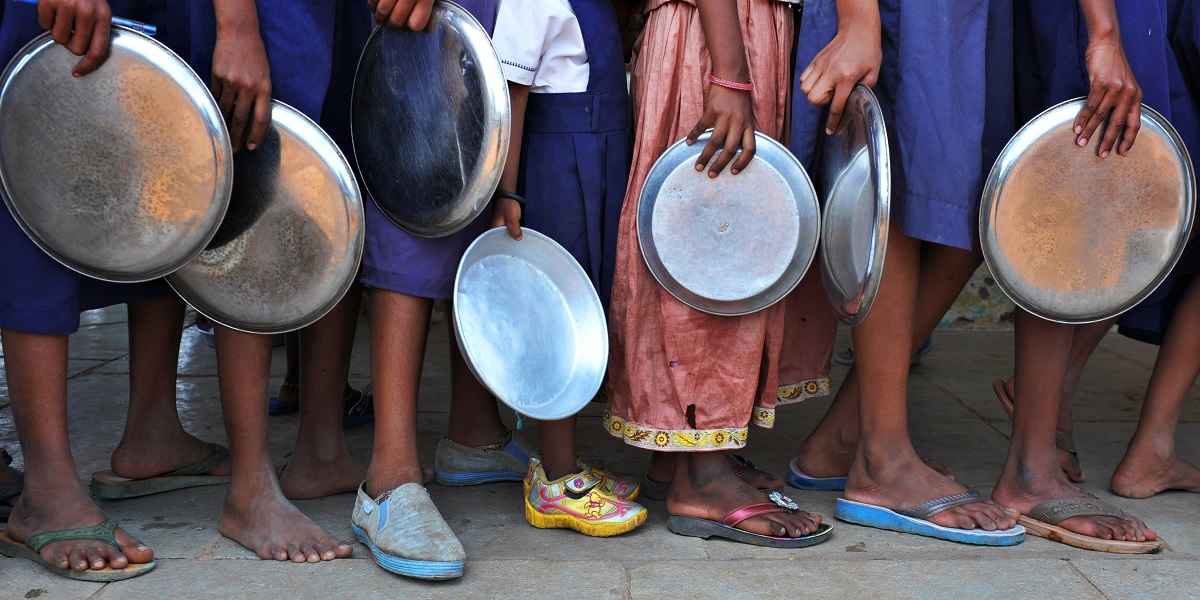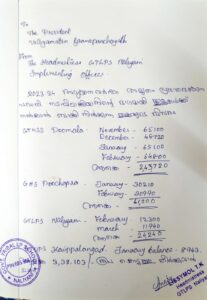In Kerala, welfare schemes and grants for tribal students are facing significant delays, with authorities at various levels providing conflicting explanations for the issue.
Published Dec 17, 2024 | 9:00 AM ⚊ Updated Dec 23, 2024 | 1:20 PM

But behind these colourful plates lurks a serious public health question, Is fortified rice safe for everyone?
Kerala, renowned for recording the lowest school dropout rates in the country, is faced with the allegation of according low priority to its most vulnerable.
In Poomala, Idukki district, tribal students have been left to fend for themselves as the government-funded breakfast scheme has been halted for over six months.
The breakfast scheme caters to students from poor tribal homes walking long distances to school. Starting the day at school with a full stomach would offer them a better chance to concentrate on their lessons.
At the Government Tribal Higher Secondary School in Poomala, there are 322 students enrolled in grades 1 to 12. The school falls under the Thodupuzha Assistant Educational Office (AEO).

Copy of the letter written by HM Lissymol TK, Government Tribal LP School, Naliyani, regarding the funds needed to be paid to schools for AMRITAM
The deputy director of education, Idukki district, clarified to South First that 108 students depend on the breakfast scheme, Amrutam.
What is noteworthy is that despite the high penetration of the news media in Kerala, this neglect of the tribal students’ breakfast scheme became public knowledge only when two sixth-grade students at the school wrote to the president of the Velliyamattom panchayat, explaining their hardship at having to attempt to study on empty stomachs.
According to the District Education Officer (DEO) of Idukki, the district is home to 25 tribal schools, encompassing lower primary, upper primary, and higher secondary levels.
Among these, three are Model Residential Schools (MRS) managed by the Scheduled Tribes (ST) Department.
The state government’s shortage of funds abruptly halted the breakfast scheme in June. Liji, the Tribal Extension Officer at Poomala, told South First that there are four government tribal schools in the panchayat— Government Tribal HSS Poomala, Government Tribal Lower Primary School Naliyani, Government Tribal Upper Primary School Karippilangad, and Government Tribal High School Poochapra — all of which were part of the breakfast initiative.
“The crisis has now been resolved. Funds have been allocated to the panchayat. The amount will be released immediately after the bills are submitted,” Liji said.
The recent Economic Review presented in the state assembly showed that Kerala has made significant strides in reducing dropout rates, particularly among Scheduled Caste (SC) and Scheduled Tribe (ST) students.
Yet, these groups face disparities, with SC students recording a dropout rate of 0.06 percent and ST students 0.5 percent during the 2022-23 academic year, substantially higher than the 0.07 percent noted for other categories.
The tribal student population is estimated at 90,902, accounting for 21.33 percent of the overall tribal population.
Wayanad district leads with the highest number of tribal students (33,071), followed by Idukki, Palakkad, and Kasaragod districts.
According to data provided by Mohandas Puthussery, president of Velliyamattom panchayat, the Tribal Sub Plan (TSP) Fund for the year 2024-2025, which aims to enhance the socio-economic development of the Scheduled Tribe (ST) population, is ₹82,07,000.
Of this, ₹7,68,228 has been allocated to the Amrutam project. However, the amount disbursed by the government for this financial year is only ₹35,280.
Headmistress Lissymol TK of Government Tribal Lower Primary School, Naliyani, who is also the implementing officer for the Amrutam project in four tribal schools in Poomala, has written to the panchayat authorities regarding pending payments for the year 2023-2024.
South First is in possession of a copy of that letter, which highlights the outstanding amounts that need to be disbursed to the schools to ensure the continuation of the project.
For GTHSS Poomala, the pending amount includes ₹65,100 for November, ₹48,720 for December, ₹65,100 for January, and ₹64,800 for February, totalling ₹2,43,720.
GHS Poochapra has ₹30,210 due for January and ₹30,990 for February, summing up to ₹61,200.
At GTLPS Naliyani, there is ₹12,300 due for February and ₹11,940 for March, amounting to ₹24,240.
Finally, Government Tribal UP School Karippilangad has ₹8,943 pending for January.
In total, ₹3,38,103 remains unpaid across these schools, hindering the progress of the AMRUTAM project.
On 12 December 2024, when South First contacted panchayat president Mohandas Puthusserry, he said the government had released only ₹17 lakh, a far cry from the ₹58 lakh originally promised.
He emphasised that this amount is insufficient to continue the project and clear the outstanding debt, as several lakhs are already due to departmental stores.
According to Abhilash Rajan, a member of Poomala Ward, “The panchayat cannot generate substantial funds on its own due to its small, rural nature. There are very few industries. The majority of the population is tribal and there are groups from the other backward communities. We have a very low tax revenue for the panchayat each financial year. This is why we are forced to rely on government support,” he told South First.
The Scheduled Tribes Directorate of the state government acknowledged that the breakfast scheme, which falls under the purview of the General Education Department, had been halted. It also accepted the delay in restarting the scheme, attributing the troubles to issues of gaining funds from the government.
The cost of providing meals to tribal students comes to ₹30 per student per day, they said.
Shabin, the ST promoter in Poomala, revealed that the fund shortage at GTHSS Poomala was addressed with immediate assistance from Kerala Grameen Bank. The bank provided ₹15,000 from their CSR fund as a relief measure.
It may be pertinent to point out here that this amount is a tiny fraction of the Rs12 lakh crore siphoned off from banks by large corporates in the first eight years of the Modi government. This happened because these corporates took loans from the banks, which were later written off as Non-Performing Assets – the whole process remains legal.
“In Poomala, the Hindu Malayaraya tribal community constitutes the largest group, followed by the Hindu Oorali tribals. There are also two or three families from the Hindu Malavedan community,” Shabin said.
These are prominent tribal groups in the southern parts of Kerala, particularly Idukki, Kottayam, and Pathanamthitta.
Unlike prominent tribes such as the Kurichians and Kurumbas in Wayanad and Palakkad, these communities face significant economic challenges and have far fewer resources.
As a result, any disruption of the free breakfast programme for students will undoubtedly have a profound impact.
South First found that it is not the breakfast scheme alone that has taken a hit in the past few months.
A scheme offering free transport to school for tribal students has also been hit, burdening parents and guardians with the additional cost of their children’s education.
The Vidyavahini project provides free transportation to tribal students. This scheme too has been reeling under financial crisis.
Originally known as Gothrasaradhi, the initiative was renamed Vidyavahini in the 2023-24 academic year.
Launched in the 2013-14 academic year under the Tribal Development Scheme, the project aims to encourage regular school attendance among tribal students by offering transportation facilities, with the goal of improving their interest in education.
However, Abhilash Rajan, a Panchayat member of Poomala, pointed out significant issues with the Vidyavahini project.
He highlighted that there are still pending salary dues to jeep drivers who transport students from tribal colonies through forest routes.
On the other hand, Liji, the Tribal Extension Officer at Poomala, clarified that Vidyavahini currently operates in three schools in the region, excluding Poomala GTHSS, as the school vehicles are already in use.
At present, 75 students from GHS Poochapra, 28 from GTLPS Naliyani, and 34 from Govt Tribal UP School Karippilangad are among those benefiting from the initiative.
The most remote area served by the project is Kozhippally, where students depend on private buses after reaching the main roads from their colonies.
Additionally, the Thadiyanal road to Ambedkar tribal settlement is nearly complete, and awaiting clearance from the Forest Department to open.
The Scheduled Tribes directorate of the state government said there are approximately 28,000 tribal students across Kerala relying on the Vidyavahini project.
Nearly ₹3 crore is spent on the project each month.
They also pointed out that such complaints are not limited to Idukki, but are prevalent in other districts as well.
When South First reached out to parents from Poomala, they highlighted another pressing issue: the severe delay in the distribution of uniform allowances and stipends.
Eligible students are entitled to ₹500 as a uniform allowance, ₹200 as a monthly stipend, and an annual lump sum grant of ₹800.
However, these payments have not yet been fully disbursed.
Asked about this, an official at the ST Directorate said new Central Government directives mandate that students whose Aadhaar details are seeded to bank accounts will be the only ones to receive the grants without delay.
The problem, however, lies in frequent errors and confusion among bank staff regarding Aadhaar linking and seeding. At GTHSS Poomala, ₹1,17,260 — belonging to the 2022-2023 academic year — is still being processed.
OR Kelu, Kerala Minister for Welfare of Scheduled Castes, Scheduled Tribes, and Backward Classes, refused to accept that this was a grave matter. “Such delays have not been brought to my attention, things are running smoothly, except for a few incidents,” he said.
However, Commissioner TK Vasu for Scheduled Castes and Scheduled Tribes acknowledged that there were troubles and said he had sought a detailed report from the ST Directorate.
Amidst the government’s focus on youth, sports festivals, and cultural programmes, the pressing needs of tribal children must not be overlooked.
(Edited by Rosamma Thomas).
